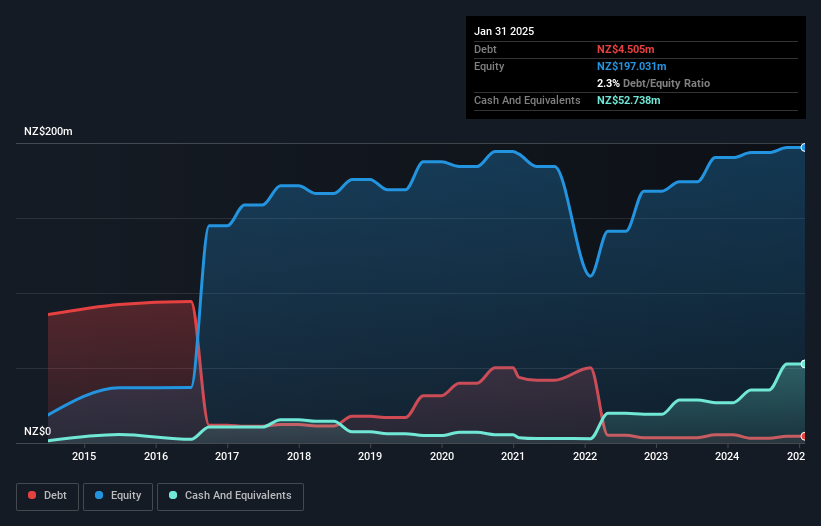
Some say volatility, rather than debt, is the best way to think about risk as an investor, but Warren Buffett famously said that 'Volatility is far from synonymous with risk.' When we think about how risky a company is, we always like to look at its use of debt, since debt overload can lead to ruin. We note that New Zealand King Salmon Investments Limited (NZSE:NZK) does have debt on its balance sheet. But the real question is whether this debt is making the company risky.
Our free stock report includes 3 warning signs investors should be aware of before investing in New Zealand King Salmon Investments. Read for free now.When Is Debt A Problem?
Debt is a tool to help businesses grow, but if a business is incapable of paying off its lenders, then it exists at their mercy. Part and parcel of capitalism is the process of 'creative destruction' where failed businesses are mercilessly liquidated by their bankers. However, a more frequent (but still costly) occurrence is where a company must issue shares at bargain-basement prices, permanently diluting shareholders, just to shore up its balance sheet. Of course, plenty of companies use debt to fund growth, without any negative consequences. When we think about a company's use of debt, we first look at cash and debt together.
What Is New Zealand King Salmon Investments's Debt?
As you can see below, New Zealand King Salmon Investments had NZ$4.51m of debt at January 2025, down from NZ$5.42m a year prior. However, its balance sheet shows it holds NZ$52.7m in cash, so it actually has NZ$48.2m net cash.

A Look At New Zealand King Salmon Investments' Liabilities
We can see from the most recent balance sheet that New Zealand King Salmon Investments had liabilities of NZ$36.6m falling due within a year, and liabilities of NZ$18.6m due beyond that. On the other hand, it had cash of NZ$52.7m and NZ$14.2m worth of receivables due within a year. So it can boast NZ$11.8m more liquid assets than total liabilities.
This surplus suggests that New Zealand King Salmon Investments has a conservative balance sheet, and could probably eliminate its debt without much difficulty. Simply put, the fact that New Zealand King Salmon Investments has more cash than debt is arguably a good indication that it can manage its debt safely.
See our latest analysis for New Zealand King Salmon Investments
It is just as well that New Zealand King Salmon Investments's load is not too heavy, because its EBIT was down 59% over the last year. Falling earnings (if the trend continues) could eventually make even modest debt quite risky. When analysing debt levels, the balance sheet is the obvious place to start. But it is future earnings, more than anything, that will determine New Zealand King Salmon Investments's ability to maintain a healthy balance sheet going forward. So if you want to see what the professionals think, you might find this free report on analyst profit forecasts to be interesting.
Finally, while the tax-man may adore accounting profits, lenders only accept cold hard cash. New Zealand King Salmon Investments may have net cash on the balance sheet, but it is still interesting to look at how well the business converts its earnings before interest and tax (EBIT) to free cash flow, because that will influence both its need for, and its capacity to manage debt. During the last two years, New Zealand King Salmon Investments produced sturdy free cash flow equating to 78% of its EBIT, about what we'd expect. This cold hard cash means it can reduce its debt when it wants to.
Summing Up
While we empathize with investors who find debt concerning, you should keep in mind that New Zealand King Salmon Investments has net cash of NZ$48.2m, as well as more liquid assets than liabilities. The cherry on top was that in converted 78% of that EBIT to free cash flow, bringing in NZ$28m. So we are not troubled with New Zealand King Salmon Investments's debt use. There's no doubt that we learn most about debt from the balance sheet. However, not all investment risk resides within the balance sheet - far from it. We've identified 3 warning signs with New Zealand King Salmon Investments , and understanding them should be part of your investment process.
At the end of the day, it's often better to focus on companies that are free from net debt. You can access our special list of such companies (all with a track record of profit growth). It's free.
Valuation is complex, but we're here to simplify it.
Discover if New Zealand King Salmon Investments might be undervalued or overvalued with our detailed analysis, featuring fair value estimates, potential risks, dividends, insider trades, and its financial condition.
Access Free AnalysisHave feedback on this article? Concerned about the content? Get in touch with us directly. Alternatively, email editorial-team (at) simplywallst.com.
This article by Simply Wall St is general in nature. We provide commentary based on historical data and analyst forecasts only using an unbiased methodology and our articles are not intended to be financial advice. It does not constitute a recommendation to buy or sell any stock, and does not take account of your objectives, or your financial situation. We aim to bring you long-term focused analysis driven by fundamental data. Note that our analysis may not factor in the latest price-sensitive company announcements or qualitative material. Simply Wall St has no position in any stocks mentioned.
About NZSE:NZK
New Zealand King Salmon Investments
Engages in the farming, processing, and sale of salmon products in New Zealand, North America, Australia, Japan, Europe, China, and internationally.
Flawless balance sheet and fair value.
Similar Companies
Market Insights
Community Narratives




